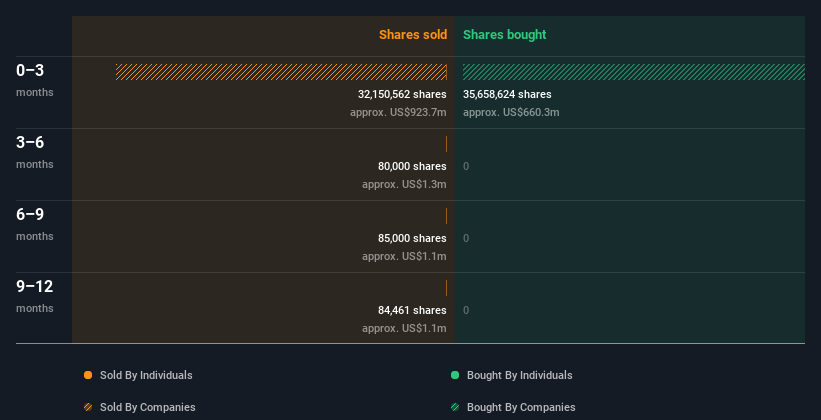Symbotic Insiders Made A Wise Decision By Selling US$5.9m Worth Of Stock
Last week, Symbotic Inc.'s (NASDAQ:SYM) stock jumped 40%, but insiders who sold US$5.9m worth of stock in over the past year are likely to be in a better position. Selling at an average price of US$18.64, which is higher than the current price might have been the right call as holding on to stock would have meant their investment would be worth less now than it was at the time of sale.
Although we don't think shareholders should simply follow insider transactions, we do think it is perfectly logical to keep tabs on what insiders are doing.
See our latest analysis for Symbotic
The Last 12 Months Of Insider Transactions At Symbotic
Over the last year, we can see that the biggest insider sale was by the Senior VP of Sales, Michael Dunn, for US$2.0m worth of shares, at about US$35.35 per share. So it's clear an insider wanted to take some cash off the table, even below the current price of US$57.61. As a general rule we consider it to be discouraging when insiders are selling below the current price, because it suggests they were happy with a lower valuation. However, while insider selling is sometimes discouraging, it's only a weak signal. It is worth noting that this sale was only 43% of Michael Dunn's holding. The only individual insider seller over the last year was Michael Dunn.
Michael Dunn divested 314.46k shares over the last 12 months at an average price of US$18.64. You can see a visual depiction of insider transactions (by companies and individuals) over the last 12 months, below. If you click on the chart, you can see all the individual transactions, including the share price, individual, and the date!
If you are like me, then you will not want to miss this free list of growing companies that insiders are buying.
Insiders At Symbotic Have Sold Stock Recently
There was substantially more insider selling, than buying, of Symbotic shares over the last three months. In that time, Senior VP of Sales Michael Dunn dumped US$2.1m worth of shares. On the flip side, Independent Director Rollin Ford spent US$198k on purchasing shares (as mentioned above) . Since the selling really does outweigh the buying, we'd say that these transactions may suggest that some insiders feel the company has been fully valued in recent months.
Insider Ownership
Looking at the total insider shareholdings in a company can help to inform your view of whether they are well aligned with common shareholders. I reckon it's a good sign if insiders own a significant number of shares in the company. Insiders own 0.1% of Symbotic shares, worth about US$47m. While this is a strong but not outstanding level of insider ownership, it's enough to indicate some alignment between management and smaller shareholders.
What Might The Insider Transactions At Symbotic Tell Us?
The insider sales have outweighed the insider buying, at Symbotic, in the last three months. Despite some insider buying, the longer term picture doesn't make us feel much more positive. While insiders do own shares, they don't own a heap, and they have been selling. We're in no rush to buy! In addition to knowing about insider transactions going on, it's beneficial to identify the risks facing Symbotic. For instance, we've identified 2 warning signs for Symbotic (1 is significant) you should be aware of.
Of course, you might find a fantastic investment by looking elsewhere. So take a peek at this free list of interesting companies.
For the purposes of this article, insiders are those individuals who report their transactions to the relevant regulatory body. We currently account for open market transactions and private dispositions, but not derivative transactions.
Have feedback on this article? Concerned about the content? Get in touch with us directly. Alternatively, email editorial-team (at) simplywallst.com.
This article by Simply Wall St is general in nature. We provide commentary based on historical data and analyst forecasts only using an unbiased methodology and our articles are not intended to be financial advice. It does not constitute a recommendation to buy or sell any stock, and does not take account of your objectives, or your financial situation. We aim to bring you long-term focused analysis driven by fundamental data. Note that our analysis may not factor in the latest price-sensitive company announcements or qualitative material. Simply Wall St has no position in any stocks mentioned.

 Yahoo Finance
Yahoo Finance 
